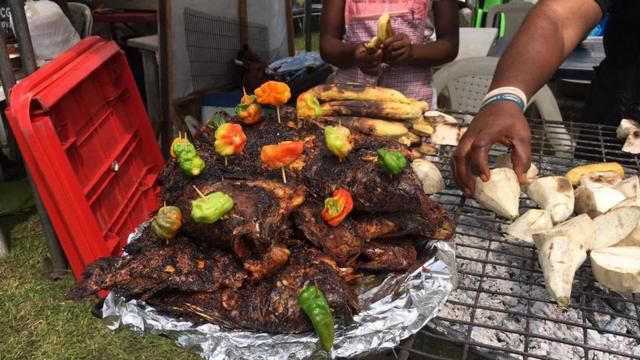The Essence of Nigerian Street Food
Street food in Nigeria is more than just a convenient way to grab a quick bite. It’s a reflection of the country’s diverse culinary traditions, a source of livelihood for many, and a social hub where people from all walks of life come together to enjoy delicious meals. The street food scene is a vibrant and integral part of Nigerian culture, offering a unique window into the country’s rich tapestry of flavors and customs.
Must-Try Street Food Dishes in Nigeria

Nigerian street food boasts an array of delectable dishes that are sure to satisfy any craving. Some of the most popular and must-try options include:
- Suya: Spicy grilled meat skewers that are a staple of Nigerian street food.
- Akara: Deep-fried bean fritters that are crispy on the outside and fluffy on the inside.
- Puff Puff: Sweet, doughy balls that are perfect for satisfying a sugar craving.
- Jollof Rice: A savory and spicy rice dish that is popular across West Africa.
- Ewa Agoyin: A hearty dish of mashed beans served with a spicy pepper sauce.
Regional Specialties and Flavors
Nigerian street food also showcases the country’s regional culinary diversity. Each region has its own unique dishes and flavors that reflect local ingredients, cooking techniques, and cultural influences. Some notable regional specialties include:
- Asun: A spicy goat meat delicacy popular in the southwestern region.
- Nkwobi: A savory cow foot dish that is a favorite in the southeastern part of the country.
- Masa: A fermented rice cake that is a staple in northern Nigeria.
- Boli: Roasted plantains that are a popular snack in the Niger Delta region.
The Art of Street Food Vending
Nigerian street food vendors are skilled artisans who take pride in their craft. They often specialize in one or two dishes, perfecting their recipes and techniques over years of practice. Many vendors have been in the business for generations, passing down their knowledge and expertise to younger family members.
Street food vending is also an important source of income for many Nigerians, particularly women. It provides a means of self-employment and financial independence, while also contributing to the local economy.
Experiencing Nigerian Street Food
To fully immerse yourself in the Nigerian street food experience, it’s important to know where to go and what to expect. Street food vendors can be found in various locations, including:
- Markets: Large, open-air markets are a hub for street food vendors, offering a wide variety of dishes and snacks.
- Roadsides: Many vendors set up shop along busy roads and highways, catering to commuters and passersby.
- Neighborhoods: Residential areas often have their own local street food scenes, with vendors serving up neighborhood favorites.
When trying Nigerian street food, it’s important to follow some basic guidelines to ensure a safe and enjoyable experience. Look for vendors with clean and well-maintained stalls, and be sure to only consume thoroughly cooked meats and vegetables. It’s also a good idea to carry your own water or drink to stay hydrated.
The Future of Nigerian Street Food
As Nigeria continues to urbanize and globalize, the street food scene is evolving and adapting. Some vendors are experimenting with new flavor combinations and fusion dishes, while others are focusing on traditional recipes and techniques.
There is also a growing interest in the formalization and regulation of the street food industry, with initiatives aimed at improving food safety standards and providing support for vendors. These efforts have the potential to not only enhance the street food experience for consumers but also to create new opportunities for vendors and contribute to the overall growth of the Nigerian economy.
Conclusion
Nigerian street food is a vibrant and essential part of the country’s culinary and cultural landscape. From the spicy suya skewers to the sweet and fluffy puff puff, there is a dish to satisfy every craving and a story behind every bite. By exploring the world of Nigerian street food, you not only get to enjoy delicious meals but also connect with the rich history, traditions, and flavors that make Nigeria such a fascinating and diverse country.



